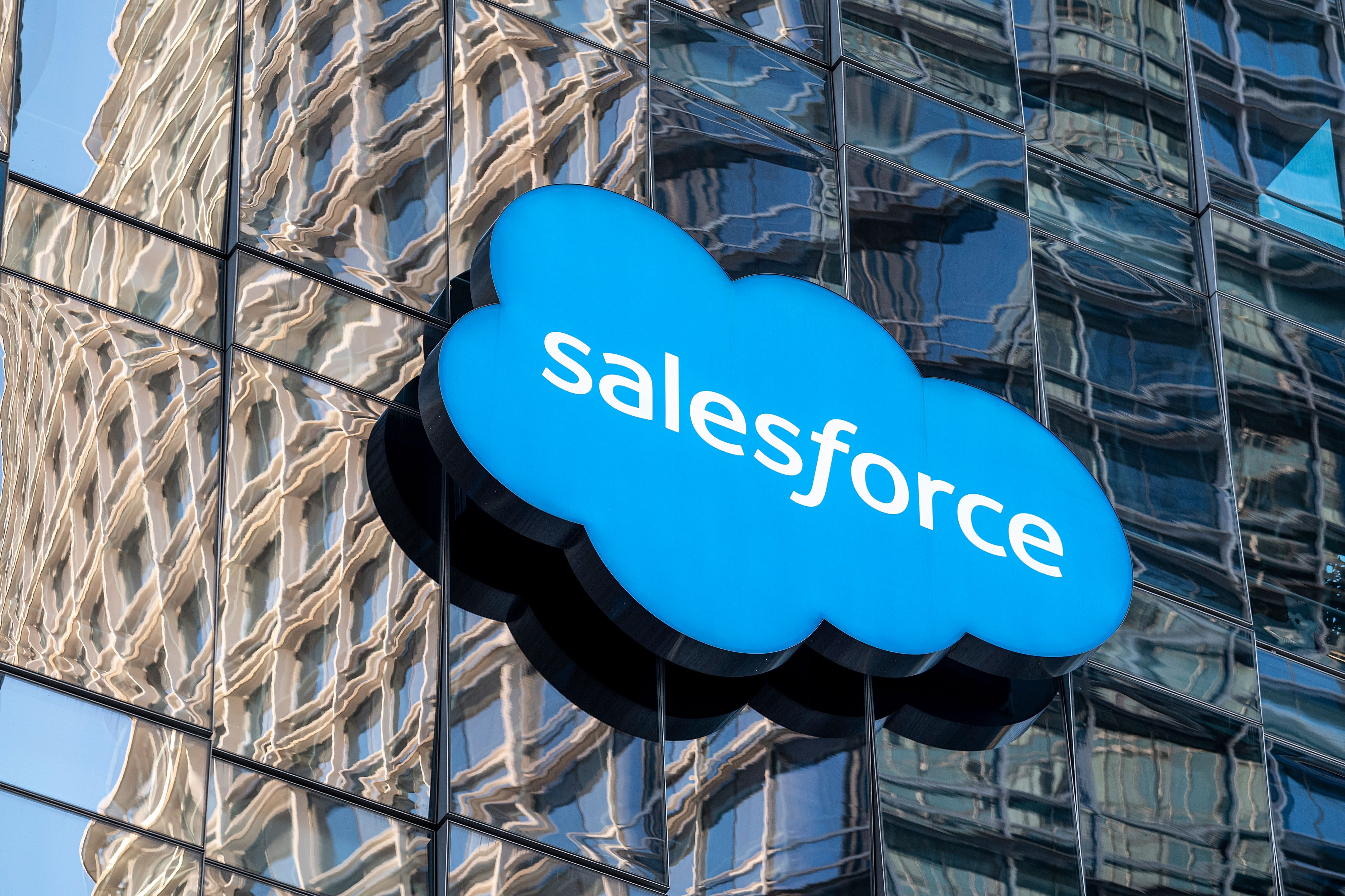
Club holding Salesforce (CRM)’s fiscal fourth-quarter results crushed expectations across the board Wednesday, while its forward guidance made clear CEO Mark Benioff is uniquely positioned to deliver profitability at the enterprise software pioneer. Revenue grew 14% year-over-year, or 17% on a constant currency basis, to $8.38 billion, exceeding analysts’ forecasts of $7.99 billion, according to estimates compiled by Refinitiv. Non-GAAP earnings-per-share (EPS) of $1.68, beat the $1.36-per-share EPS predicted by analysts, Refinitiv data showed. Operating margins came in at 4.3% on a GAAP basis, and 29.2% on non-GAAP basis, compared with expectations of 2% and 22.2%, respectively. Operating cash flow surged nearly 41% from the previous year, to $2.79 billion, beating estimates of $2.5 billion. Free cash flow of $2.57 billion outpaced the $2.32 billion forecasted by analysts. Shares of Salesforce climbed more than 15% in afterhours trading Wednesday, to around $193 apiece. Bottom line Salesforce’s stellar fiscal year 2023 fourth-quarter results come as management has been under mounting pressure from a slate of activist investors, including Elliott Management , to improve profitability and rein in costs. Benioff and his team more than delivered. During a post-earnings conference call with analysts and investors Wednesday, Benioff did not directly address the role these activists may have played in shaping management’s recent strategy. But in an interview with Jim Cramer earlier in the day, he said he was receptive to their ideas to make Salesforce more profitable. “We can learn from everybody. We do learn from everybody,” he said. Not only did profit margins come in significantly above expectations on both a GAAP (Generally Accepted Accounting Principles) and non-GAAP basis, sales came in much stronger than expected, too — demonstrating the software giant can still deliver double-digit revenue growth, despite its large size. Management’s full fiscal year 2024 revenue guide amounts to just over 10% growth, compared with fiscal year 2023. Salesforce also reported strong cash flow, while the board of directors doubled the company’s share repurchase authorization to $20 billion from $10 billion. With $4 billion already returned to shareholders in fiscal 2023, the team has $16 billion left in the tank. Notably, the authorization increase will allow management to fully offset the dilutive impact of share-based compensation for the entirety of fiscal 2024. Benioff told Jim Wednesday, “Our profitability is our highest priority.” That claim was evidenced by the outstanding guidance the company provided. The sales and earnings forecasts exceeded expectations for both the first quarter and full fiscal year 2024. Moreover, the team is targeting a GAAP operating margin of roughly 10.8% and adjusted operating margin of about 27%, both well ahead of analysts’ expectations for 6% and 22.8%, respectively. Geographically, on a constant currency basis, sales increased 14% year-over-year in the Americas, 20% in Europe, the Middle East, and Africa (EMEA), and 30% in the Asia Pacific region (APAC). Customer revenue attrition came in below 7.5%, the lowest level in Salesforce’s 24-year history and a sign that businesses can’t operate without Salesforce’s mission-critical software products, even in a difficult operating environment. Transformation underway Benioff on Wednesday said he felt the need “to press the hyperspace button” and accelerate the company’s profitability goals by two years. To do so, management is focused on four key areas: Short- and long-term restructuring. Benioff said management is “reigniting [Salesforce’s] performance culture” and doubling down on the accountable management of its sales organization, while reducing headcount and consolidating the company’s real estate footprint. Improving profitability and productivity. The company is intensifying the analysis of every dollar and resource invested in the business, with a focus on “driving operational excellence and automation across the business.” Prioritizing core innovations. The company is trying to better integrate acquisitions and prioritizing those “core innovations that are driving customer success,” Benioff said. He noted that MuleSoft was included in seven of the company’s top-ten deals with clients in the fiscal fourth, while Tableau was included in all ten, demonstrating management’s ability to cross-sell to customers after integrating those two acquisitions. A deeper relationship with shareholders. Benioff promoted Mike Spencer, head of investor relations, to the leadership team. He said the board is also forming a new “business transformation” committee to “ensure a high degree of accountability.” “Changes that used to take months are happening in weeks. Changes that used to take weeks, are happening in days, and changes that used to take days are happening in hours,” Benioff added. (Jim Cramer’s Charitable Trust is long CRM. See here for a full list of the stocks.) As a subscriber to the CNBC Investing Club with Jim Cramer, you will receive a trade alert before Jim makes a trade. Jim waits 45 minutes after sending a trade alert before buying or selling a stock in his charitable trust’s portfolio. If Jim has talked about a stock on CNBC TV, he waits 72 hours after issuing the trade alert before executing the trade. THE ABOVE INVESTING CLUB INFORMATION IS SUBJECT TO OUR TERMS AND CONDITIONS AND PRIVACY POLICY , TOGETHER WITH OUR DISCLAIMER . NO FIDUCIARY OBLIGATION OR DUTY EXISTS, OR IS CREATED, BY VIRTUE OF YOUR RECEIPT OF ANY INFORMATION PROVIDED IN CONNECTION WITH THE INVESTING CLUB. NO SPECIFIC OUTCOME OR PROFIT IS GUARANTEED.
Signage on a Saleforce office building in San Francisco, California, U.S., on Tuesday, Feb. 23, 2021.
David Paul Morris | Bloomberg | Getty Images
Club holding Salesforce (CRM)’s fiscal fourth-quarter results crushed expectations across the board Wednesday, while its forward guidance made clear CEO Mark Benioff is uniquely positioned to deliver profitability at the enterprise software pioneer.

